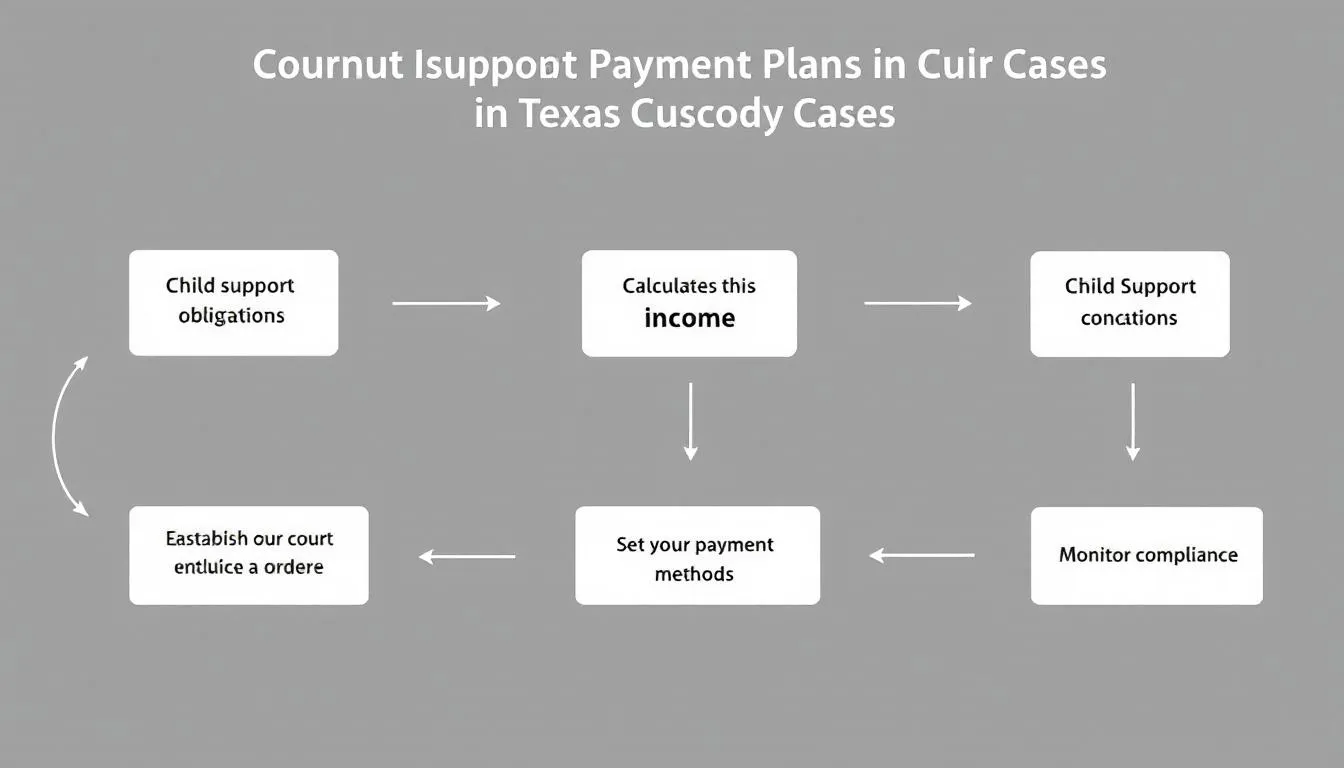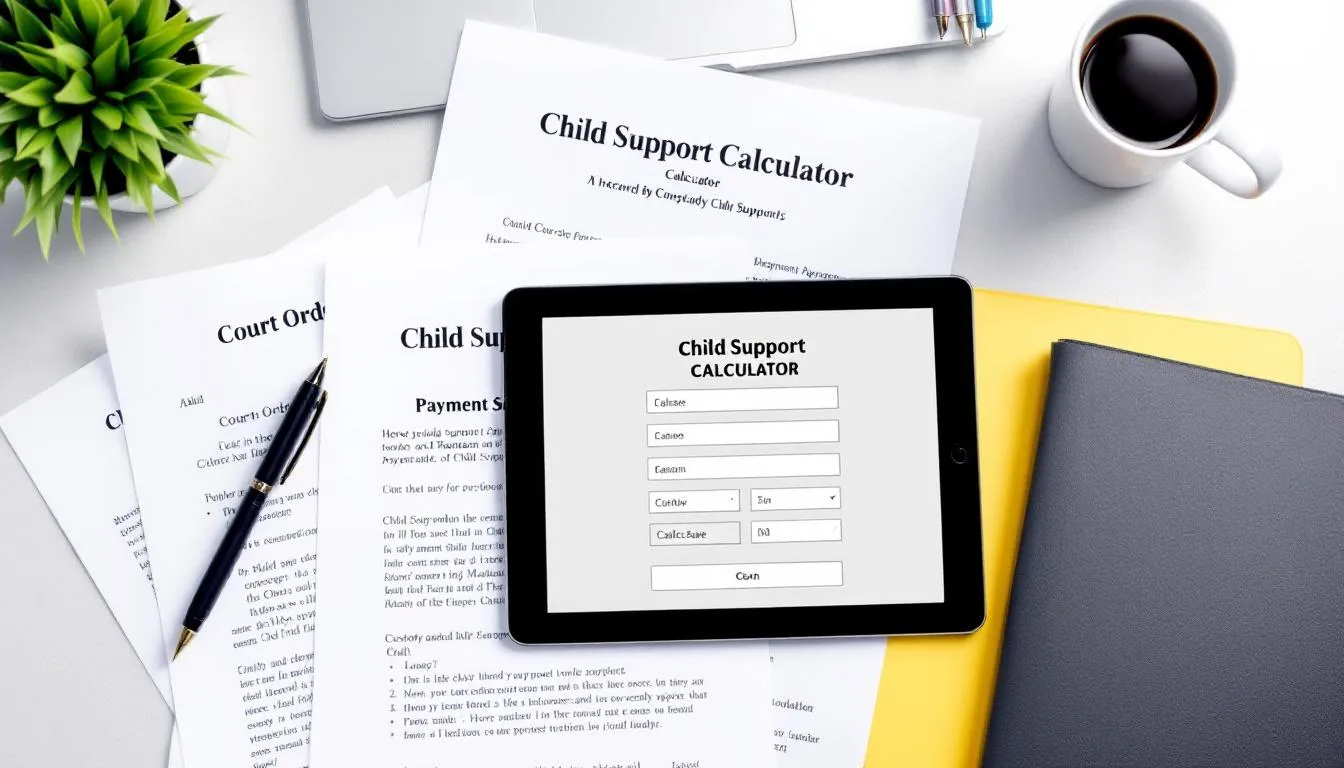
You’re up to your elbows in laundry, your phone’s buzzing with a text from your co-parent, and dinner’s burning on the stove—again. The last thing you want to add to the mix? Figuring out how to afford a custody lawyer. It’s no secret that legal help can be expensive, which is why so many parents ask the same big question: “How do payment plans work with Texas child custody attorneys?”
The good news? Payment plans make it possible to hire a skilled custody attorney without having to pay everything upfront—giving you room to breathe and focus on what really matters: your child and your future.
In this blog, we’ll walk you through exactly how payment plans work, who qualifies, and what to watch out for. You’ll also get insider legal tips, little-known financial options, and real stories from families who’ve been right where you are. Whether you’re just starting your custody case or overwhelmed mid-battle, this guide offers practical solutions from a team of Texas attorneys who’ve helped thousands of parents navigate tough times with confidence.
At The Law Office of Bryan Fagan, PLLC, our mission is simple: educate families and protect futures. So grab a cup of coffee, take a deep breath, and keep reading—you’re not alone in this.
Key Takeaways
- Payment plans provide financial flexibility for families involved in custody disputes, allowing them to manage attorney fees in manageable installments instead of large upfront payments.
- Various payment structures, such as flat fees, hourly rates, and retainers, are available from Texas custody attorneys to accommodate different financial situations, enhancing accessibility to legal support.
- Engaging experienced custody attorneys not only increases the likelihood of favorable custody outcomes but also helps mitigate emotional stress during the legal process through expert guidance and support.
Understanding Payment Plans for Texas Child Custody Attorneys
When navigating a Texas child custody dispute, protecting your parental rights and focusing on your child’s well-being can feel overwhelming—especially when legal costs add financial pressure. How Do Payment Plans Work With Texas Child Custody Attorneys? As our legal professionals have helped many clients understand, payment plans can make experienced representation more accessible by dividing fees into manageable monthly or biweekly installments. This flexibility allows families to pursue the legal outcomes they need without facing an immediate financial burden.
Rather than paying everything upfront, structured payment plans give parents room to budget while remaining fully engaged in the legal process. This is especially important during emotionally challenging custody battles, where the stakes involve not only legal rights but also your child’s day-to-day life. Under the Texas Family Code § 153.002, the court’s guiding principle is always the best interest of the child—but asserting that interest effectively requires knowledgeable advocacy and preparation that often isn’t possible without legal guidance.
Our family law team has also seen how child support enforcement often intersects with custody matters. If you’re concerned about unpaid support, our article on ensuring he pays child support offers important insights into enforcement strategies under Texas Family Code § 154, including wage garnishment and contempt actions. These legal tools can help protect your child’s financial stability as you resolve custody arrangements.
At The Law Office of Bryan Fagan, PLLC, we believe no parent should have to choose between legal protection and financial security. That’s why we offer customized payment plans designed around your needs and the complexity of your case. Whether you’re facing a high-conflict dispute or modifying an existing order, our attorneys are here to support your journey—educating families and protecting futures every step of the way.

What Are Payment Plans?
Payment plans are structured financial arrangements that allow clients to pay their attorney fees over time instead of upfront. This arrangement can be particularly beneficial for families who may not have the financial resources for paying a lump sum at the beginning of their case, especially if they have already paid some fees.
Many Texas child custody lawyers offer flexible payment options to accommodate varying financial situations. These payment plans typically involve monthly or bi-monthly installments, making it easier for clients to manage their budgets while still receiving the legal support they need.
Why Payment Plans Matter
The value of payment plans in child custody disputes cannot be overstated. These plans alleviate the financial strain that often accompanies legal battles, allowing clients to focus on their case without the constant worry of mounting legal fees.
Effective payment options are crucial in ensuring that clients maintain access to legal representation without overwhelming their finances. Payment plans help families manage the cost of legal services, ensuring they get the guidance and support needed during custody disputes.
Moreover, payment plans can make a significant difference in the overall outcome of a child custody case. With manageable financial arrangements, families are more likely to engage experienced attorneys who can provide the best possible legal counsel, ultimately leading to more favorable custody arrangements and child support payments.
How Payment Plans Work in Texas Custody Cases
In Texas, understanding how do payment plans work with Texas child custody attorneys is crucial for families facing emotionally charged custody disputes and mounting legal costs. These plans provide financial flexibility by allowing clients to pay attorney fees over time rather than in one large upfront sum. As our attorneys frequently advise, payment plans can be tailored to a client’s needs—taking into account the complexity of the case, income level, and anticipated court involvement. This makes quality legal representation more attainable, even in contested custody matters governed by Texas Family Code § 153, which prioritizes the best interests of the child above all else.
In addition to legal fees, parents often face court-related expenses that aren’t always anticipated at the outset of a case. These may include service of process fees, the cost of obtaining certified copies of final orders, and fees for court-appointed professionals such as custody evaluators or amicus attorneys. According to our family law team, incorporating these potential costs into your overall legal budget—and spreading them across a payment plan—can reduce stress and help you remain focused on your child’s well-being throughout the proceedings.
Our legal professionals have helped many clients understand that financial planning in divorce and custody cases isn’t just about affordability—it’s about peace of mind. For deeper insight into the emotional and financial dynamics of child support during divorce, we recommend reading our article on embracing the emotional realities of child support, which aligns with recent updates in Texas Family Code § 154, the section governing support obligations.
At The Law Office of Bryan Fagan, PLLC, we recognize that financial concerns can be a barrier to justice. That’s why we offer custom-tailored payment plans designed to empower parents to pursue custody arrangements that truly serve their child’s best interests—without sacrificing financial stability.

Types of Payment Structures
Texas child custody attorneys may offer several payment structures to accommodate different financial situations. Common options include flat fees, hourly rates, and retainers. Flat fee payment structures provide clients with a clear understanding of the total costs upfront, which can be particularly helpful in budgeting for legal expenses.
Hourly rates for Texas child custody attorneys typically range from $200 to $500, depending on the attorney’s experience and the complexity of the case, with an average hourly rate reflecting these factors.
Retainer fees, which can range from $3,000 to $15,000, are another common payment structure. In this arrangement, attorneys may charge for additional services on an hourly basis.
Flexibility in Payment Plans
One of the key benefits of payment plans is their flexibility. Attorneys can adjust fees based on the specific type of case or the client’s financial hardship, making legal services more accessible to a broader range of clients. This flexibility can include negotiation and mediation options, which can help reduce the overall financial burden for clients.
Adaptable payment structures from attorneys ensure families can access necessary legal support without jeopardizing their financial stability. This approach not only benefits the clients but also fosters a more positive attorney-client relationship.
Key Questions to Ask About Payment Plans
When considering payment plans, it’s essential to:
- Ask the right questions to avoid any financial surprises.
- Be transparent about your budget.
- Ensure you have a clear fee agreement in writing.
- Take the first step in financial planning to maintain detailed records to help save time and reduce costs.
Additionally, consider additional expenses such as court costs, court reporters, and legal document preparation when budgeting for a custody case.
Benefits of Working with Experienced Custody Attorneys
As we’ve seen in our work with Texas families, knowing how do payment plans work with Texas child custody attorneys can be the key to feeling in control during a custody dispute. An experienced custody attorney can guide you through the legal intricacies of conservatorship, visitation, and parental rights under Texas Family Code § 153, while also making representation more affordable through flexible payment options tailored to your circumstances.
Strong legal counsel offers more than just courtroom advocacy. According to our family law team, the right attorney can help you manage emotionally charged situations, keep negotiations on track, and prepare a thorough case strategy. From drafting parenting plans to gathering critical evidence, their role is to protect your rights while keeping your focus on what’s best for your child. With recent updates to the Texas Family Code emphasizing the child’s emotional and physical well-being, having someone who understands these changes is more important than ever.
Our legal professionals have helped many clients recognize that custody disputes often intersect with child support obligations, which are addressed under Texas Family Code § 154. Understanding these obligations can shape both short- and long-term financial planning in a custody case. To explore this in detail, our article on Texas child support uncovered breaks down the current guidelines, enforcement tools, and legislative updates.
Choosing an attorney who offers both strategic legal guidance and payment flexibility allows you to pursue the best possible outcome without jeopardizing your financial stability. This combination of legal expertise and practical support helps ensure you can focus on building a secure future for your child, even in the midst of a difficult custody process.

Legal Expertise and Guidance
An attorney with a strong track record in similar cases can provide insights into potential outcomes and effective strategies. Specializing in family law, these attorneys have a deeper understanding of the intricacies involved in custody and support cases, which can significantly impact the outcomes of legal proceedings in most cases under certain circumstances. A lawyer with this expertise can be invaluable.
Effective attorneys ensure that complex legal concepts are explained clearly, fostering a better understanding of the legal process. Most attorneys maintain open lines of communication with your attorney, which can significantly enhance case management and reduce the likelihood of errors.
Experienced custody lawyers possess comprehensive knowledge of ever-changing child custody laws, assisting clients in navigating these complexities. With their strategic case preparation and effective presentation of evidence, attorneys can provide powerful legal representation.
Emotional Support and Stability
Emotional support and understanding throughout the legal process can significantly alleviate stress for clients facing family law issues. Clients frequently express gratitude for the supportive and transparent guidance they received throughout their custody proceedings, highlighting the critical emotional benefits of having a knowledgeable attorney.
Financial Considerations During Custody Disputes
According to our family law team, understanding how do payment plans work with Texas child custody attorneys can significantly ease the strain of navigating a custody dispute. Financial concerns are often one of the most overwhelming parts of the process, but flexible payment arrangements allow parents to secure experienced legal representation without the pressure of paying all fees upfront. This approach not only provides financial breathing room but also enables parents to keep their attention on the matters that truly matter—protecting their child’s well-being and securing an outcome that serves their best interests under Texas Family Code § 153.
As we’ve seen in our work with Texas families, payment plans tailored to a client’s needs can transform the way a case unfolds. By reducing immediate financial stress, parents can devote more energy to preparing for mediation, gathering important evidence, and working closely with their attorney to develop a parenting plan that meets both legal requirements and their child’s needs. This can be especially important when related issues like child support obligations are in play, which are governed by Texas Family Code § 154 and may require strategic legal action.
Our legal professionals have helped many clients understand that financial flexibility and strong advocacy often go hand-in-hand in achieving favorable custody outcomes. In some cases, child support determinations require going beyond standard guidelines to ensure the child’s needs are fully met. For more insight, we recommend reviewing our resource on child support when the guideline amount is insufficient, which explains when and how Texas courts may deviate from the typical formula to address unique circumstances.
By incorporating a well-structured payment plan into your legal strategy, you can relieve much of the financial pressure that often accompanies custody disputes. This allows you to remain fully engaged in the process, confident that you have both the legal expertise and the financial plan needed to protect your child’s future.

Impact of Divorce on Children
Divorce can have a significant emotional and psychological impact on children. An attorney can help mitigate this stress by offering objective advice and support during mediation.
Therapeutic interventions can assist children in adjusting to changes stemming from custody arrangements, reducing feelings of instability in a child’s life.
Maintaining Household Stability
Maintaining household stability during financial transitions is crucial for the well-being of all family members. A knowledgeable attorney acts as a buffer between parents, reducing direct confrontations and emotional strain during custody cases. Counseling can significantly improve communication skills between parents, helping to reduce conflict during custody disputes.
Utilizing both legal support and counseling resources can create a more stable and positive environment for children during custody transitions and visitation for the noncustodial parent, supported by these resources.
Effective Communication with Schools
Legal custody allows parents to make significant decisions about their child’s education, including school selection and participation in activities. Joint legal custody requires both parents to collaborate on educational decisions, which can lead to potential disagreements.
Establishing open communication channels, such as shared calendars, can help parents and the other parent contact each other to stay informed and reduce misunderstandings, benefiting from the parent’s perspective.
Community Resources and Counseling
Community support services can provide vital assistance to families dealing with emotional and financial challenges. Many local organizations offer resources such as food assistance, housing support, and mental health services to families in need.
These resources play a vital role in offering assistance to families facing challenges during custody disputes. Families are encouraged to reach out to these community organizations for the support they need during difficult times.
Local Community Resources
Many local organizations offer resources such as food assistance, housing support, and mental health services to families in need. Community resources play a vital role in offering assistance to families facing challenges during custody disputes. Families are encouraged to reach out to these community organizations for the support they need during difficult times.
Importance of Counseling
Counseling can help parents and children navigate the emotional complexities of custody disputes, fostering resilience and coping strategies. Engaging in counseling during custody disputes can provide coping strategies for both parents and children, reducing overall stress.
The Role of the Texas Attorney General’s Office
As we’ve seen in our work with Texas families, understanding how do payment plans work with Texas child custody attorneys often goes hand-in-hand with knowing the broader support systems available during custody disputes. One of the most important of these is the Texas Attorney General’s Office, which plays a critical role in ensuring that children receive the financial resources they need through the enforcement of child support obligations. Under Texas Family Code § 154, the Attorney General’s Child Support Division has the authority to initiate wage withholding, place liens on property, intercept tax refunds, and take other enforcement actions to secure timely payments for custodial parents.
According to our family law team, the Attorney General’s involvement is not limited to collection efforts. Their office can also assist with establishing paternity, modifying child support orders to reflect changes in circumstances, and helping parents understand their rights and responsibilities. While these services are invaluable, they do not replace the comprehensive legal strategy that an experienced family law attorney can provide—especially when complex custody and visitation issues under Texas Family Code § 153 are intertwined with financial matters.
Our legal professionals have helped many clients understand that navigating child support enforcement effectively often requires both state resources and personalized legal representation. For parents seeking a deeper understanding of their support rights and how they are protected under Texas law, we recommend reading our resource on your child support rights, which covers enforcement tools, recent updates to the law, and practical steps for protecting your child’s financial security.
By combining the enforcement capabilities of the Attorney General’s Office with a tailored payment plan for your legal fees, you can reduce financial stress while ensuring your child’s needs remain front and center. This dual approach allows you to stay engaged in both the legal and financial aspects of your custody case, giving you the best possible chance at a stable and secure future for your family.

Enforcing Child Support Orders
The Texas Attorney General’s office enforces child support orders using various methods, such as legal tools to ensure timely payments and enforcement actions, in accordance with Texas law. This includes wage garnishment, liens on property, contempt proceedings, and court order compliance to ensure enforcement.
Parents who fail to comply with child support orders can face serious consequences, including legal penalties, wage garnishments, and changes to future support based on their non-compliance. A non-custodial parent who doesn’t address payment issues promptly may accumulate arrears, leading to further legal complications.
Additional Support Services
Beyond enforcing child support orders, the Texas Attorney General’s office offers several additional services to support families during custody disputes, including resources related to the Texas family code. These services include legal assistance in custody matters and resources for custodial parents. These services from the Attorney General’s office contribute to a more stable environment for children and families during custody disputes.
These efforts ensure that non-custodial parents meet their financial obligations, thus supporting the child’s well-being. The Attorney General’s office plays a crucial role in ensuring Texas families get the help they need by offering legal guidance and support.
Real-Life Case Studies and Testimonials
Real-life examples and testimonials can effectively demonstrate how payment plans make legal representation more accessible during custody disputes. Families have navigated complex custody disputes successfully with the help of payment plans, showcasing how financial flexibility can lead to positive outcomes.
Success Stories
A mother successfully gained custody of her child after demonstrating that her living environment was more suitable for raising the child, thanks to legal support and payment flexibility. Such stories highlight the significant difference that personalized payment plans can make, enabling families to access the legal support they need.
Client Testimonials
The Law Office of Bryan Fagan, PLLC has received numerous testimonials praising the compassion shown to clients during custody disputes. Many testimonials highlight the transparent guidance offered, which helped clients navigate the complexities of custody cases. Overall, clients report high satisfaction with the support and expertise received from the Law Office of Bryan Fagan, PLLC.
Choosing the Right Family Law Attorney
As our attorneys frequently advise, choosing the right legal representation in a custody matter is one of the most important decisions you can make for your family’s future. When considering how do payment plans work with Texas child custody attorneys, it’s equally important to evaluate whether the attorney you select has the skill, focus, and dedication your case deserves. Under Texas Family Code § 153, custody decisions must align with the best interests of the child, and having an attorney who specializes in Texas family law ensures that your legal strategy fully reflects these standards and the latest legislative updates.
Specialization matters because family law is constantly evolving. Attorneys who work exclusively in this area are more likely to stay current on recent changes, such as modifications to parental rights provisions or adjustments to court procedures. According to our family law team, this up-to-date knowledge allows them to craft arguments and parenting plans that are both legally sound and tailored to your specific needs. A strong track record, a commitment to open communication, and a compassionate approach to client relationships can be just as critical as courtroom experience.
Our legal professionals have helped many clients understand that while reputation and expertise are vital, accessibility and financial flexibility are also key. This is why discussing payment plan options early in the attorney selection process can help reduce stress and allow you to focus on case strategy. If you’d like to explore how our team approaches custody matters, visit Texas Child Custody Attorney for more details on our process, resources, and client-focused services.
For additional guidance on preparing for a custody case and selecting the right representation, our article on how to prepare for your Texas custody suit offers practical tips that align with both the Texas Family Code and the realities Texas parents face in court. Combining the right attorney, a clear legal strategy, and a manageable payment plan gives you the best opportunity to protect your child’s future while safeguarding your own peace of mind.

Evaluating Experience and Specialization
Evaluating an attorney’s experience and legal specialization in their practice area is critical in ensuring competent representation in family law matters. Experienced attorneys with legal experience, including those who are board certified, can provide invaluable guidance on the nuances of family law and custody situations, which can significantly impact outcomes.
Many local organizations offer free or low-cost legal assistance specifically for issues related to family law and custody matters.
Importance of Clear Communication
Clear communication is essential in legal representation as it fosters a better understanding between clients and attorneys. Effective communication enhances the overall effectiveness of the legal process and sets clear expectations for both parties, ensuring full representation.
Clear communication minimizes misunderstandings, reducing potential conflicts and disputes during legal proceedings. Transparent communication regarding fee agreements helps prevent unexpected costs, thereby making legal services more financially manageable.
Conclusion:
Going through a custody battle while managing life’s everyday chaos isn’t easy—and figuring out how to pay for legal help shouldn’t make it harder. If you’ve been stressing over attorney fees, we hope this gave you a little more clarity—and maybe even a little relief. Payment plans aren’t just about breaking costs into smaller chunks; they’re about making sure you have access to the legal support you deserve, when you need it most.
Every family’s story is different, and yours matters. Whether you’re just starting to explore your options or knee-deep in the process, having the right Texas family law attorney by your side can make all the difference—not just in court, but in your day-to-day peace of mind. And yes, it’s okay to ask for help. It’s also okay to want a payment plan, a plan for your case, and a plan for your future.
If you’re ready to talk, we’re here to listen. Let’s figure out what works for your situation—your goals, your child, and your budget. Because at The Law Office of Bryan Fagan, PLLC, we’re not just here to fight legal battles. We’re here to educate families and protect futures, one real conversation at a time.
And hey—if you’ve made it this far without reheating your coffee three times, you’re already winning. Let’s take the next step together.
Frequently Asked Questions About Custody Lawyer Payment Plans in Texas
Do custody lawyers do payment plans?
Yes, many custody lawyers in Texas offer payment plans to make legal services more accessible. These plans allow clients to spread out the cost of representation over time instead of paying everything upfront.
What happens if you can’t afford an attorney in Texas?
If you cannot afford an attorney in Texas for a family law matter like custody, you may qualify for legal aid through organizations such as Lone Star Legal Aid or Texas RioGrande Legal Aid. However, availability is limited and not all cases are eligible.
How much does a child custody lawyer cost in Texas?
The cost of a child custody lawyer in Texas can range from $200 to $500 per hour, with retainer fees typically starting around $3,000 to $5,000 and going higher depending on the complexity of the case.
How do attorney payment plans work?
Attorney payment plans usually involve a written agreement where the client pays a set amount on a regular schedule—such as monthly or bi-weekly—until the legal fees are paid off. Terms vary by law firm and may include late fees or minimum retainers.
What type of custody costs the most?
Contested custody cases typically cost the most because they often involve court hearings, mediation, expert witnesses, and extended legal preparation. Uncontested or agreed custody arrangements are generally much less expensive.
What is it called when you cannot afford an attorney?
When you cannot afford an attorney, you are considered ‘indigent.’ In some criminal and limited civil cases, indigent individuals may be eligible for a court-appointed attorney or public defender, but this is less common in family law matters like custody.
What should you not tell your attorney?
While you should be honest with your attorney, avoid lying, withholding important facts, or demanding unethical behavior. Full transparency allows your attorney to represent you effectively while staying within the bounds of the law.
What happens if I can’t pay for a lawyer?
If you can’t pay for a lawyer, some attorneys may stop work on your case until payment resumes, depending on your agreement. You may be able to negotiate new terms, seek legal aid, request court fee waivers, or explore self-representation for basic matters.




